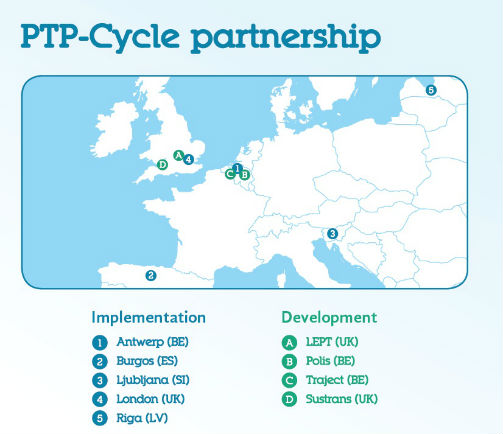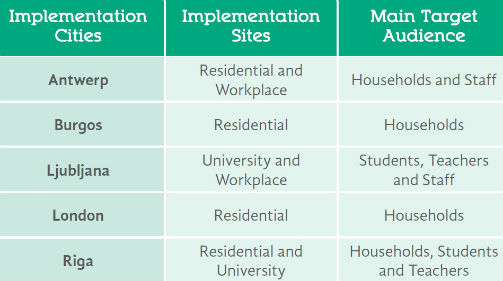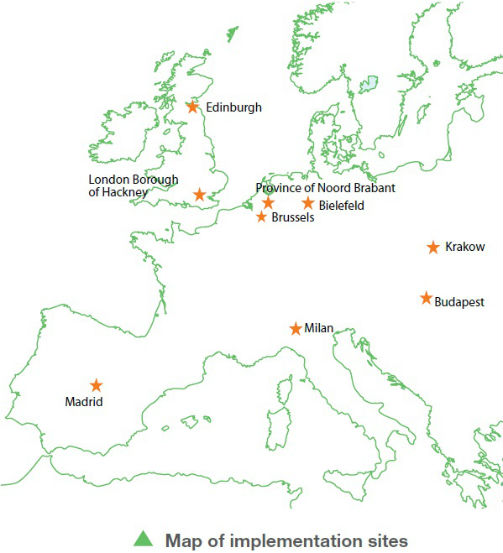The partnership provides up to date information on the latest funding opportunities for the transport sector, helps boroughs to develop project proposals and contact international partners. Occasionally, LEPT will take on the leading role in projects with a pan-London character.
Below you will find the past projects coordinated by LEPT (PTP-Cycle and STARS) and also previous projects with which LEPT have been involved and links to their external websites.
- SWITCH (London Borough of Hounslow)
- CARMA (Royal Borough of Kensington & Chelsea)
- SEGMENT (London Borough of Hounslow)
- TRAILBLAZER (London Borough of Sutton)
- SMILES (London Borough of Merton)
- CycleCities (London Borough of Merton)
- EVUE (Westminster City Council)
- VELOCITTA (London Boroughs of Lambeth and Southwark)
- PFASTA (London Borough of Newham)
- LaMilo (London Borough of Camden)
- Novelog (London Borough of Barking and Dagenham)
ASTUTE
Advancing Sustainable Transport in Urban areas To promote Energy efficiency
ASTUTE was a three year project, from 2005 - 2008, funded by the Intelligent Energy for Europe's (IEE) STEER Programme. Its aim is to increase the number of walking and cycling journeys in Urban Areas.
ASTUTE identified the barriers which public and private sector organisations face in promoting walking and cycling, and produced an online toolkit comprises many best practice examples which will help you overcome these barriers.
Project Partners:
London, UK | Dublin, Ireland | Granada, Spain | Siracusa, Italy | Budapest, Hungary | Graz, Austria
Please contact a member of the LEPT team for more information.
COMMERCE
Creating Optimal Mobility Measures to Enable Reduced Commuter Emissions
COMMERCE was a three year project, part of the Intelligent Energy for Europe's (IEE) STEER Programme. It increased the number and quality of Mobility Plans developed by small and medium sized companies by providing tools and standards based on best practice across Europe. Mobility Plans are also known as Travel Plans and their development is a clear way of reducing commuter's CO2 emissions.
Partner Cities:
Bucharest, Romania | Budapest Hungary | Plovdiv, Bulgaria | Kaunas Lithuania | Paris, France
Please contact a member of the LEPT team for more information.
EPOMM-PLUS
European Platform on Mobility Management- Partners Learning Urban Sustainability
EPOMM-PLUS was a three year project running from 2009 - 2012, funding by the Intelligent Energy for Europe's (IEE) STEER Programme.
It aimed to achieve a quantum leap in the use of mobility management in Europe. It establishes EPOMM (the European Platform On Mobility Management) as the authority and the networking instrument for the promotion of mobility management in the EU, thus strengthening EU cooperation and dissemination in this field.
Project Partners:
Mobiel 21 | Eurocities | London Councils | Centre for studies on urban planning transportation and public facilities | Centre for Studies and Experimentation of Public Works | Rijkswaterstaat DVS Centre for Transport and Navigation | WSP Sweden AB | Austrian Energy Agency | Motiva | Club "Sustainable Development of Civil Society" | Development Agency Sinergija Ltd | Polish Environmental Partnership Foundation | Center for Environmental Studies | Estonian Institute for Sustainable Development |Research Institute for Regional and Urban Development, Building and Construction of the Federal State of North Rhine-Westphalia | Euromobility | UAB "Statybos strategija" | Transport Research Centre | Aristotle University of Thessaloniki | Regional Environmental Centre Country Office Romania | Perform Energia
Please contact a member of the LEPT team for more information.
PIMMS
Partner Initiatives for the development of Mobility Management Services
PIMMS was a 3 year project from 2005 - 2008, funded by the Interreg IIIC Programme. It was a network operation focussed on the exchange of best practice information (a) between the partners and (b) between them and their regional partners. Its objective was to achieve change by empowering regional decision-makers to extend the use of mobility management.
Project Partners:
London, UK | Graz, Austria | Frankfurt, Germany | Serres, Greece | Treviso, Italy | Almada, Portugal | Terrassa, Spain | Stockholm, Sweden
The PIMMS project is the basis for the PIMMS TRANSFER project
PIMMS-TRANSFER
Partner Initiatives for the development of Mobility Management Services & TRansferring Actions iN Sustainable mobility For European Regions
PIMMS TRANSFER was a three year project, running from 2008 to 2011.
The project was funded under the European Union's INTERREG IVC programme, which promotes the exchange of good practices between regions. The project raised mobility management up the agenda in the partner cities through tailored programmes of exchanges, training and awareness-raising activities.
Partners:
London, UK | Graz, Austria | Sofia, Bulgaria | Larnaca, Cyprus | Frankfurt, Germany | Serres, Greece | Treviso, Italy | Klaipeda, Lithuania | Rotterdam,Netherlands |
Gdansk, Poland | Almada, Portugal | Timisoara, Romania | Bratislava, Slovakia | Maribor, Slovenia | Stockholm, Sweden
Project website: www.pimms-transfer-eu.org
PTP-Cycle
PTP-Cycle was a LEPT-coordinated project that used Personalised Travel Planning (PTP) methods to promote a shift from private motor vehicle use towards cycling, walking and public transport. As the term suggests, PTP provided tailored information directly to the individual on sustainable mobility options through a one to one discussion with a PTP Adviser. An information pack based on the needs of the individual was then hand-delivered, leading to a greater propensity for behaviour change than a one-size-fits-all-approach.
How does PTP-Cycle work?
Five cities have come together in PTP-Cycle - supported by LEPT, Polis, Traject, and Sustrans - to develop the first pan-European PTP Delivery Programme, transferring their know-how to a larger audience of European cities. Using the approach of segmentation, each implementation site has identified specific target groups with the largest potential for behaviour change.


The trained PTP travel advisers engaged the audience, asking particular questions to highlight which alternatives might lead to a shift in behaviour. The resulting Personalised Travel Plan packs might have included discounts on bikes from local shops, cycling training sessions, local travel information materials and other services provided by the city or public transport operators in the target area.
Capacity building at the local level
PTP-Cycle offered a holistic approach to assist cities, businesses and universities in developing their PTP processes.
- Training Programme: Implementation cities trained by PTP expert Sustrans and build local delivery teams.
- PTP Training Programme Manual: Handbooks developed and translated to assist PTP adopting cities.
- Local Knowledge Hubs: Field offices give a permanent presence and resource across the residential areas, workplaces and university campuses.
- 50 PTP Champions recruited: Volunteers deliver supporting events, campaigns and competitions in their communities.
PTP-Cycle demonstrates that PTP activities can be transferred and adopted by diverse implementation sites and target groups, and lead to increased levels of cycling and walking in cities, as well as public transport use and car-sharing. In so doing we are supporting cities in their pursuit of reduced congestion, cleaner air, healthier citizens and reduced CO2 levels.
STARS
STARS (Sustainable Travel Accreditation and Recognition for Schools) developed a pan-EU accreditation scheme and a peer-to-peer engagement programme to get more children cycling to school in 9 EU cities, including the London Borough of Hackney. The project attained a 5% modal shift from car to bike for journeys to school, and engaged over 270 primary and secondary schools across Europe.
As well as in Hackney, the project took place in Bielefeld in Germany, Brussels in Belgium, Budapest in Hungary, Edinburgh in Scotland, Krakow in Poland, Madrid in Spain, Milan in Italy and the Dutch Province of Noord Brabant. LEPT coordinated implementation of STARS on behalf of these cities.

How does STARS work?
STARS promoted sustainable methods of transport to school. It seeked to foster a life-long positive attitude to active travel in children, and at the same time encouraged parents and families to reconsider how they travel, specifically to get children to school. Car journeys to school take place at rush hour, but they also commonly involve two trips, there and back. Removing these journeys from the road, and encouraging the family to travel by alternative means, offers an efficient method to cut congestion and decrease emissions.
The project had two tiers, allowing it to reach both primary and secondary school pupils in different ways.
STARS in Primary schools
Based on a successful programme already developed by Modeshift STARS, primary schools worked towards achieving Bronze, Silver or Gold certification, a measure of the school and pupils’ commitment to and accomplishment of a change in how their pupils travel to school. To reach these levels schools held different events for cycling or educating pupils on the importance of sustainable and active travel.
STARS in Secondary schools
Secondary school students were encouraged and assisted to design campaigns to increase cycling amongst their peers through a network of Youth Travel Ambassador Schemes and an annual Cycle Challenge.
Youth Travel Ambassadors had the responsibility to campaign in their own school for pupils to make a sustainable change in their travel habits.
The Cycle Challenge offered a chance for schools across Europe to measure their progress against each other, and there were opportunities for pupils from different countries to communicate during the challenge.
STARS in your city
Running until 2016, STARS left a legacy of youth active travel, that once established continued in the participating regions.
.If you have any questions about the STARS project please contact a member of the LEPT team.
